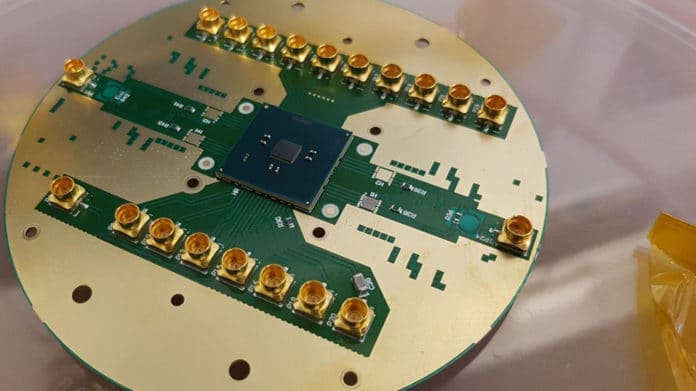The most promising quantum algorithms require quantum processors that host millions of quantum bits when targeting practical applications. Qubits are typically addressed individually by a single wire.
This stands in the way of a scalable quantum computer as millions of qubits require millions of wire. Scientists dubbed this as a wiring bottleneck.
The cryogenic temperatures at which qubits operate (20 millikelvin, or about -273 degrees Celsius) complicate the use of traditional solutions. A new chip designed by QuTech in the Netherlands and from Intel Corp. could act as a solution.
Scientists have developed a cryogenic controller chip, which operates at 3 kelvin, which outputs tailored microwave bursts to drive silicon quantum bits cooled to 20 millikelvins. Operating at such low temperatures, the chip opens a door towards developing a fully integrated, scalable quantum computer.
The chip is a special silicon-based integrated circuit. It is named ‘Horse Ridge’ chip after the coldest place in Oregon, where the Intel lab resides.
Co-lead investigator Edoardo Charbon, head of EPFL‘s Advanced Quantum Architecture Laboratory, said, “We exploited the same technology adopted for the conventional microprocessor, the CMOS technology. For Horse Ridge, we specifically used the Intel 22nm low-power FinFET technology. As electronic devices operate very differently at cryogenic temperatures, we used special techniques in the chip design to ensure the correct operation and drive qubits with high accuracy.’ Ultimately controller chip and qubits can be integrated on the same die (as they are all fabricated in silicon) or package, thus further relieving the wiring bottleneck.”
Scientists compared the chip with a classical room temperature controller to check the quality of the cryogenic Horse Ridge control chip. It turns out the gate fidelity of the system is very high (99.7%) and limited not by the controller but by the qubits themselves.
Scientists later used a two-qubit quantum algorithm to showcase the programmability of the controller. The Deutsch–Jozsa algorithm is one of the simplest algorithms that is much more efficient on a quantum computer than a traditional computer.
This demonstrates the ability to program the control chip with arbitrary sequences of operations and opens the way to on-chip implementation and a genuinely scalable quantum computer.
Journal Reference:
- Xue et al. CMOS-based cryogenic control of silicon quantum circuits. DOI: 10.1038/s41586-021-03469-4
